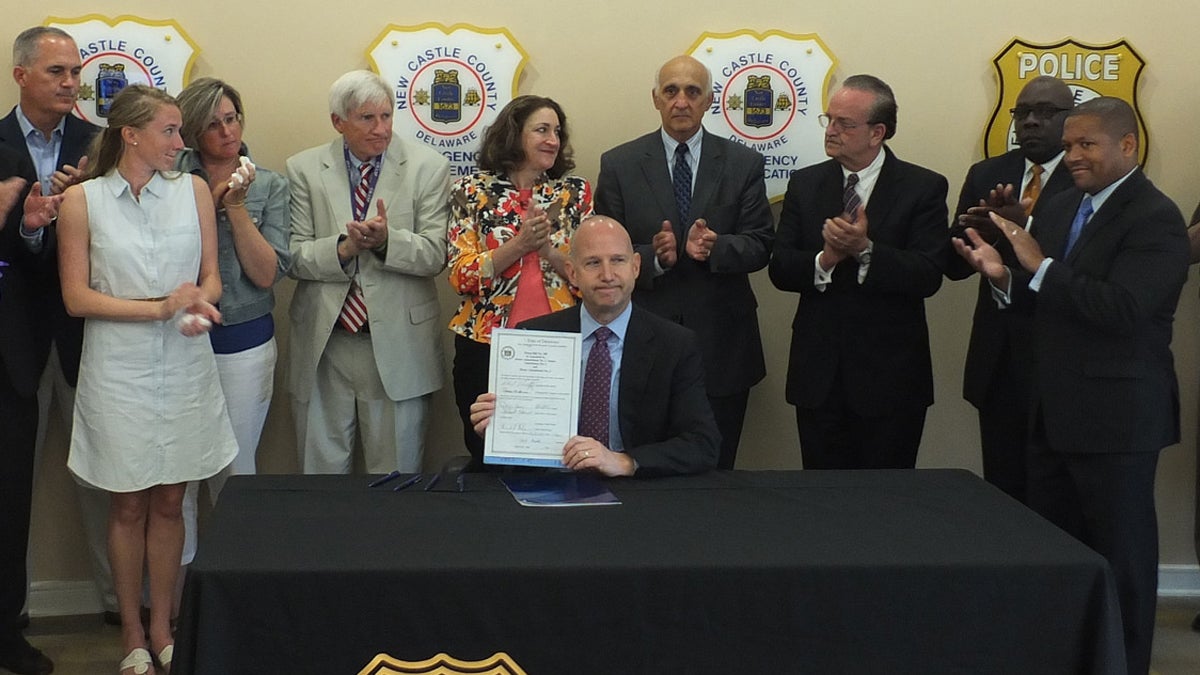Del. authorizes police to carry opiate antidote
Listen
Joined by state, county, and nonprofit leaders, Gov. Jack Markell signed House Bill 388, which allows peace officers who have completed a Delaware Health and Social Services-approved training course to receive, carry, and administer the drug naloxone. (Image courtesy of the governor's office.)
Delaware has joined 17 other states in allowing police officers to carry naloxone, a prescription drug that can reverse the effects of an opiate overdose.
The law is a response to skyrocketing levels of opiate drug abuse — and corresponding overdoses — in the state.
“These overdoses have been a problem across the country; they’ve been an increasing problem right here in Delaware,” said Delaware Gov. Jack Markell, who signed the bill into law Monday. “We know that about 15 people a month are dying in our state from suspected overdoses.”
According to the Delaware Department of Health and Social Services, between November 2013 and June of this year, 124 people have died of a suspected overdose. That fatality rate is higher than that from car accidents, and approximately three times more than in 1999.
“It’s, I believe, at an epidemic proportion,” said state Rep. Mike Barbieri, who was the primary sponsor of the bill. “I felt that we had to do something to, one, resuscitate the individual — help to keep the person alive — and then to strengthen our treatment services so that we can better address their needs.”
The law does not require officers to carry naloxone, which is marketed as Narcan. Instead, it will be up to each police force to make that decision and get the proper training, which will be offered by the Department of Heath and Social Services. Officers will be not be liable for potential harm in connection with delivering naloxone.
Chief of Police for New Castle County Col. Elmer Setting said that, at least among his own officers, the new law is being embraced.
“When you put another tool in the toolbox of these officers, where they can help someone who desperately needs help — certainly someone who’s dying of an opiate overdose — they’re going to welcome that opportunity,” he said.
Setting is nevertheless aware that not all units share his enthusiasm, and suspects his force will be one of the early adopters, ideally carrying the drug by the end of the year.
“Some folks in law enforcement may not feel that strongly about it. They don’t think it’s our mission, but I insist that our mission is changing, and that we have to face this heroin problem as a reality,” he said. “We have to try and save the ones that are hopelessly addicted and pray that we can get them into recovery.”
The legislation is the third in in recent years to address the problems of heroin and other opiate drugs. In June, a similar law was passed allowing family and friends of addicts to get a prescription for the antidote; last July, a Good Samaritan bill was passed, protecting those calling 911 to save a life from prosecution.
WHYY is your source for fact-based, in-depth journalism and information. As a nonprofit organization, we rely on financial support from readers like you. Please give today.




